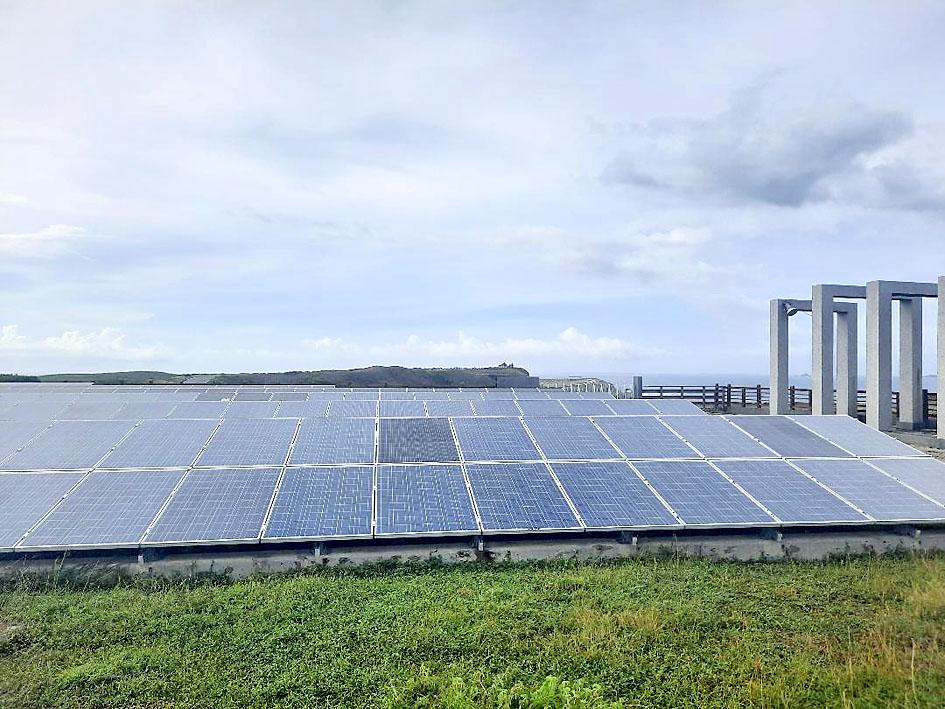Entities that require a lot of electricity are tied to a five-year “green” energy consumption plan with the promulgation of “heavy electricity user” rules this year, the Ministry of Economic Affairs said yesterday, although experts added that the regulations would have a limited effect on the renewable energy market.
The total installed electrical capacity in Taiwan is 44.7 gigawatts (GW), Taiwan Power Co (台電) manager Chang Ting-shu (張廷抒) said.
According to the Ministry of Economic Affairs, the Regulations Governing the Chartered Capacity on Electricity Consumption Agreements Which the Users Shall Install Renewable Energy Facilities for Exceeding a Certain Capacity (一定契約容量以上之電力用戶應設置再生能源發電設備管理辦法), also known as the “major electricity users’ regulations,” would add 1GW to the renewable energy market by making Taiwan’s 300 largest users of electricity boost their renewable portion to 10 percent within five years.

Photo: Liu Yu-ching, Taipei Times
“The goal is to instal 27GW in Taiwan by 2025, so 1GW is not much,” said Raoul Kubitschek, a renewable energy expert at the Taiwan branch of consultancy NIRAS Gruppen A/S.
“It will also not necessarily add 1GW to the 27GW, but be a part of it,” Kubitschek said.
President Tsai Ing-wen (蔡英文) has made 20 percent of electricity generation from renewable sources by 2025 a goal for Taiwan, while abolishing nuclear energy over the same period.
Kubitschek said that the threshold for being a “large user” should be lowered from 5,000 kilowatts to 800 kilowatts to put the regulations in line with Tsai’s goals.
Kubitschek’s sentiments were echoed by Tiffany Huang (黃台芬), a partner with international law firm Baker & McKenzie, and head of its construction and power project practice groups in Taiwan.
“From the renewable energy developer’s point of view, 1GW is not enough,” Huang said.
“Ten gigawatts will be released on the third round of the Offshore Wind Farm program alone,” she said.
According to Huang’s analysis, any government requirements regarding energy from renewable sources for large users is dwarfed by the appetite of the firms themselves.
“Look at the deal that Taiwan Semiconductor Manufacturing Co (台積電) signed with Orsted A/S,” she said.
“That is 920 megawatts on its own,” she said. “In just one deal, that is close to the 1GW that the large users’ regulations are supposed to create.”
However, the government has many factors to take into account when pushing renewable energy, Huang said.
“As an export-oriented country, we have kept retail electricity prices artificially low for 20 to 30 years,” Huang said.
“This makes renewable energy seem more expensive than it really is,” she said.
“They cannot push too much all at once,” Huang said. “It’s a start.”

MAKING WAVES: China’s maritime militia could become a nontraditional threat in war, clogging up shipping lanes to prevent US or Japanese intervention, a report said About 1,900 Chinese ships flying flags of convenience and fishing vessels that participated in China’s military exercises around Taiwan last month and in January have been listed for monitoring, Coast Guard Administration (CGA) Deputy Director-General Hsieh Ching-chin (謝慶欽) said yesterday. Following amendments to the Commercial Port Act (商港法) and the Law of Ships (船舶法) last month, the CGA can designate possible berthing areas or deny ports of call for vessels suspected of loitering around areas where undersea cables can be accessed, Oceans Affairs Council Minister Kuan Bi-ling (管碧玲) said. The list of suspected ships, originally 300, had risen to about 1,900 as

Japan’s strategic alliance with the US would collapse if Tokyo were to turn away from a conflict in Taiwan, Japanese Prime Minister Sanae Takaichi said yesterday, but distanced herself from previous comments that suggested a possible military response in such an event. Takaichi expressed her latest views on a nationally broadcast TV program late on Monday, where an opposition party leader criticized her for igniting tensions with China with the earlier remarks. Ties between Japan and China have sunk to the worst level in years after Takaichi said in November that a hypothetical Chinese attack on Taiwan could bring about a Japanese

Right-wing political scientist Laura Fernandez on Sunday won Costa Rica’s presidential election by a landslide, after promising to crack down on rising violence linked to the cocaine trade. Fernandez’s nearest rival, economist Alvaro Ramos, conceded defeat as results showed the ruling party far exceeding the threshold of 40 percent needed to avoid a runoff. With 94 percent of polling stations counted, the political heir of outgoing Costa Rican President Rodrigo Chaves had captured 48.3 percent of the vote compared with Ramos’ 33.4 percent, the Supreme Electoral Tribunal said. As soon as the first results were announced, members of Fernandez’s Sovereign People’s Party

MORE RESPONSIBILITY: Draftees would be expected to fight alongside professional soldiers, likely requiring the transformation of some training brigades into combat units The armed forces are to start incorporating new conscripts into combined arms brigades this year to enhance combat readiness, the Executive Yuan’s latest policy report said. The new policy would affect Taiwanese men entering the military for their compulsory service, which was extended to one year under reforms by then-president Tsai Ing-wen (蔡英文) in 2022. The conscripts would be trained to operate machine guns, uncrewed aerial vehicles, anti-tank guided missile launchers and Stinger air defense systems, the report said, adding that the basic training would be lengthened to eight weeks. After basic training, conscripts would be sorted into infantry battalions that would take